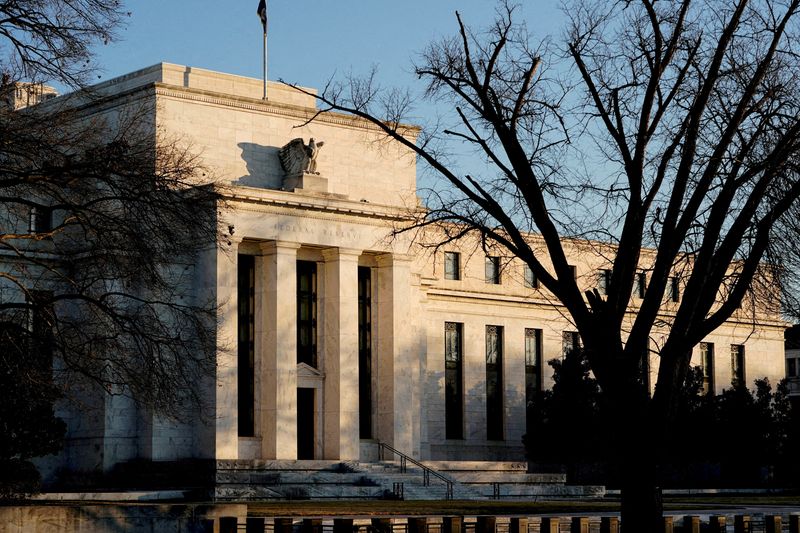(Reuters) - The Federal Reserve and the Bank of England, grabbing the baton from the ECB and the Bank of Japan, hold their first meetings of the year while U.S. tech giants and Europe banks report results and China's woes persist.
Here's a look at the week ahead in world markets from Rae Wee in Singapore, Ira Iosebashvili and Lewis Krauskopf in New York, Naomi Rovnick and Tommy Wilkes in London.
1/ FED FORWARD
The Fed is expected to leave rates unchanged at its Jan. 30-31 meeting with markets hunting for clues on when the world's top central bank will start trimming borrowing costs after one of the most aggressive tightening cycles in decades.
Expectations for rate cuts as soon as March sparked an explosive end-2023 stocks and bonds rally. Investors still believe cuts are coming this year, but stronger-than-expected data and a policymaker pushback have sapped conviction for a first quarter rate move.
Signs that Fed Chief Jerome Powell backs holding rates higher for slightly longer could give a tailwind to some of the moves the rates rethink has unleashed, such as a rebound in Treasury yields and the dollar.
Markets will watch the U.S. Treasury's quarterly refunding announcements, with overall funding totals due on Jan. 29 and maturity breakdowns on Jan. 31. Worries over U.S. government debt issuance contributed to an autumn bond rout.
And traders won't have much down time after the Fed meeting, with closely-watched US non-farm payrolls report out on Friday. A Reuters poll forecasts the U.S. economy created 162,000 new jobs in January versus 216,000 the month before.
2/ BULL OUT OF STEAM
Sterling bulls may not have much further to run.
The Bank of England is expected to keep rates steady on Feb. 1, but signal rates may not stay at their 16-year high for much longer.
The pound, up around 5% against the dollar in three months, has done well out of expectations the BoE might move more slowly on rate cuts than the Fed. That support looks shaky: Economists expect the BoE to drop its long-held warning that it will hike rates again if inflation rebounds.
Investors are also wary of the ruling Conservative party cutting taxes too generously in its March Budget, ahead of an election expected by year-end. They might have some headroom, but the prospect of entering unsustainable spending territory could hurt sterling.
3/ SINKING FEELING
The release of China's official purchasing managers' index (PMI) data on Wednesday could bolster the case that some serious repair work is needed on the world's second-biggest economy.
Cries for further stimulus to shore up a feeble post-pandemic recovery have thus far been broadly met with dribs and drabs rescue packages. Investors have fled a market that was once a broad must-have for global portfolios - sending Chinese equities to multi-year lows.
The central bank delivering a deep cut to bank reserves that will inject about $140 billion of cash into the banking system seemed to only bring temporary relief. While China narrowly surpassed last year's 5% growth target, analysts are sceptical that trend can be sustained.
PMI figures from elsewhere in the region -- South Korea, Thailand and India -- also scatter the data calendar.
4/ MEGACAPS ON PARADE A heavy week of U.S. corporate results sees megacap tech and growth companies take centre stage.
Reports are due from Apple (NASDAQ:AAPL), Microsoft (NASDAQ:MSFT), Alphabet (NASDAQ:GOOGL), Amazon (NASDAQ:AMZN) and Meta Platforms - five of the "Magnificent Seven" stocks that tallied eye-popping gains in 2023 and helped lift the S&P 500 to a new record high in January for the first time in two years. With the S&P 500 officially in a bull market, the Magnificent Seven's results will be crucial in determining whether the index can maintain its momentum. Overall, S&P 500 companies are on track to post a 4.5% rise in Q4 earnings compared to the year-ago period, according to LSEG data. Markets are focused on whether corporate earnings will indeed be rosier in 2024, as expected, with S&P 500 companies estimated to increase earnings by over 10% this year.
5/ HAPPY DAYS?
European banks have been basking in a feeling they haven't had for years: rising profits and outperforming shares. The highest rates in decades has seen lenders' net interest income - the amount they earn on loans minus deposit costs - soar. Shareholder payouts have hit record highs.
BBVA (BME:BBVA) reports full-year results on Tuesday, Santander (BME:SAN) on Wednesday, and Deutsche Bank (ETR:DBKGn), BNP Paribas (EPA:BNPP) and UniCredit follow on Thursday.

Investors will be watching out for signs the higher-rate boost has peaked, especially with the ECB expected to start cutting rates this year, but also gauge how fast banks' loan quality is deteriorating. Higher rates finally biting raises the question whether lenders can be as generous with buybacks and dividends.
Wednesday's euro zone Q4 GDP numbers and Thursday's flash January inflation data should provide the banking sector and broader market of when those ECB cuts might arrive.
(Graphics by Vineet Sachdev, Prinz Magtulis, Kripa Jayaram, Pasit Kongkunakornul and Riddhima Talwani; Compiled by Karin Strohecker; editing by Dhara Ranasinghe and Ros Russell)